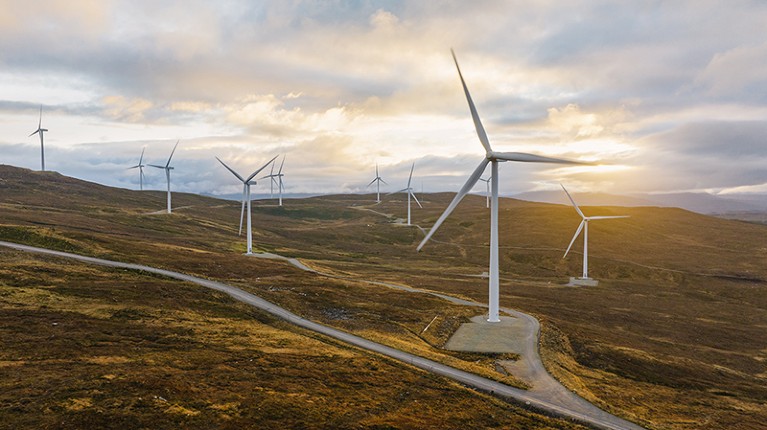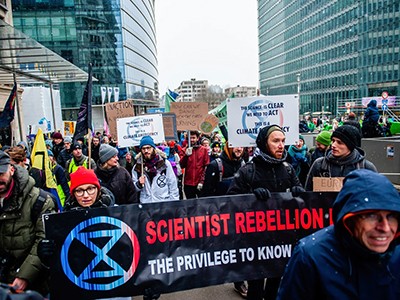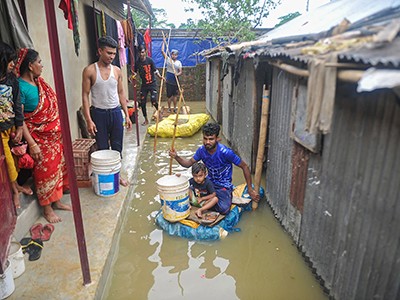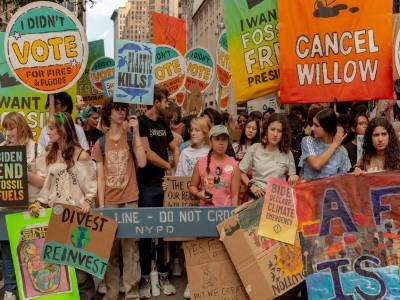[ad_1]
How doomed are we? It’s a question I have been asked as a climate scientist many times over the years, sometimes with “doomed” replaced by less printable synonyms.
I struggle to answer it every time. It’s not a scientific question, because the terms are not well defined. What does it mean to be “doomed”? And who is “we”?
Maybe some people really mean it in the most extreme and literal sense: whether global warming is going to single-handedly wipe out the human species in the near future. In that case, it’s easy to talk them down. The evidence doesn’t support that prediction.
But I think that they mostly mean to ask a more subtle question. Something like, “as someone who understands the science on climate change better than most people, what is your emotional reaction to it? How scared are you?”
Fear is an emotion. No scientist, nor anyone else for that matter, can tell you the right amount of it to feel. If you knew that you were going to die in six months, how much fear should you feel? And what should you do in response? You wouldn’t go to a scientist for the answers to these questions.
Scientists under arrest: the researchers taking action over climate change
But having facts to inform our feelings can nonetheless be helpful. Scientists can at least provide some of those. We know that the planet is warming because of human-caused greenhouse-gas emissions. We can project the rate of warming with some confidence over at least the next few decades. At a broad level, we know what many of its effects will be. But when we look more closely, and ask about the societal consequences, things get blurrier.
The global increase in temperature is the simplest and most predictable dimension of climate change. It is also the one that scares me the most, partly because the direction of change is so certain and partly because heat is such a persistent and widespread hazard. For the large proportion of the world where it’s already hot during some or all of the year, just a couple of degrees of warming will cause great societal harm. In places with cooler climates, such as much of Europe, severe heatwaves can sometimes be even more deadly, because people there are less accustomed to heat1.
Sea-level rise is another area in which we can be certain about how things are changing, even if we are uncertain about how fast. Extreme rainfall events are becoming heavier and hydrological droughts are worsening owing to faster evaporation of water from hotter soils and plants. Wildfires are becoming more frequent and severe for similar reasons, although they are also affected by forest-management practices.
With some other hazards, however, even the direction of change is uncertain. Individual hurricanes are getting more dangerous, because of strengthening winds and rains, and worsening coastal flooding as sea levels rise. But we don’t know whether hurricanes will become more or less frequent — if the latter, the overall risk they pose might decrease2. We also don’t know whether meteorological droughts — lack of rain — will become more or less prevalent, or what changes we should expect with severe convective storms that produce tornadoes and hail3.
This scientific uncertainty itself is scary, because it means that some things might well get worse faster than we expect. Scientists always expected warming to exacerbate wildfires in the western United States, but I don’t think anyone predicted that it would happen as soon and as badly as it has.
Threat multiplier
Particularly disturbing is the possibility of ‘tipping points’ — large, possibly abrupt and irreversible changes with planetary-scale consequences4, such as the loss of large chunks of the Antarctic or Greenland ice sheets, the emission of large amounts of methane from melted permafrost or sea-floor sediments, or the shutdown of the Atlantic thermohaline circulation. The probabilities of such changes happening soon are all low, but they are hard to estimate with confidence.
Despite all the facts, and the uncertainties in the facts, climate change itself is not really what keeps me up at night. Maybe that’s because my professional training has disconnected me from my emotions on this score. But I think that there is a bigger reason. If we care about climate change because we care about human well-being, then climate change can be only one part of the story.
Humanity faces many existential risks. Wars are being fought today that are already catastrophic for those in the places involved. They could become catastrophic for many more if they expand, especially in a world with many nuclear-armed nations. Loss of biodiversity and ecosystems, for example in the Amazon rainforest, is an immediate, global-scale disaster. The rise of artificial intelligence creates species-level risks, even if our assessment of them is highly speculative. What I personally find the most disturbing is the democratic backsliding in my own country — the United States — as well as in others. This threatens society’s ability to responsibly handle crises, and also tends to create other crises, as authoritarian regimes consolidate and express their power in harmful ways.

The transition towards cleaner energy sources provides glimmers of climate hope — but citizens must prevail on governments to speed it up.Credit: Getty
Climate is coupled to all these problems, in one way or another. But as scary as many direct consequences of climate change will be at 2 °C of warming or more, the greatest harm, at least in the short term, comes from its role as a ‘threat multiplier’. For example, high rates of migration from low-income countries to the United States and Europe has already been weaponized politically by far-right groups. If warming increases rates of migration, and democracies slide into authoritarianism, is that a result of climate change, or of already polarized and dysfunctional political systems? I don’t know — but I do fear this scenario deeply.
Climate change, in fact, might be one of the more certain components of our future. Social and political developments are even more difficult to predict. Can anyone really predict life on Earth in 2050, let alone 2100, well enough to suggest specific outcomes on a planetary scale, with or without climate change?
And again, even if we did know the planet’s future with perfect certainty, there still wouldn’t be a single right way to feel about it. How good or bad is the present moment, for that matter? The answer to that question depends on our position in the world. In other words: who is “we”?
Emotion and action
The writer Amitav Ghosh is one of the world’s most insightful thinkers on climate, and a friend of mine. He has argued that existential fears about climate change are actually Western fears about the end of colonial power, because in much of the rest of the world — especially for Indigenous people — “catastrophe has already happened”. For people in richer countries searching for the right way to feel about the climate crisis, it’s worth pondering this.
But maybe searching for the right emotion is not the best use of our time. Maybe a more pragmatic and constructive question than “how doomed are we?” is “what should we do about it?”
A giant fund for climate disasters will soon open. Who should be paid first?
Emotions and actions are connected, of course. ‘Doomers’ — climate communicators and activists who focus on the potential for catastrophic outcomes — are criticized for their negative messaging, which some say turns many people off and makes them less likely to act. I am sceptical of this. Greta Thunberg’s message has not been limited to expressions of positive emotion, and it’s hard to think of any climate activist who has been more effective. You could plausibly argue that the 2022 US Inflation Reduction Act, which is possibly the most important piece of federal climate legislation in the nation’s history, wouldn’t have happened without the political pressure applied by her and groups that she inspired.
But “what should we do?” is not a scientific question any more than “how doomed are we?” is. It depends on our values, and on the unscientific question of how to effect social change. Again, I don’t claim to have authoritative answers. I do think, however, that climate scientists such as myself should think a little harder about these questions than perhaps we have.
I have a few basic principles that guide my thinking. One is that democracy is crucial to human well-being, and that we should all support political candidates who think similarly, and oppose authoritarianism. In this regard, the United States has a particularly consequential election coming up this November.
Another principle is that, when it comes to the need to stop using fossil fuels, none of the uncertainties that I’ve catalogued really matter. We know that the negative consequences of warming far outweigh the positive, and that we need to cut emissions much faster than we are now5. Future scientific advances won’t change this calculus.
This means that collective, governmental action is essential to speed up the clean-energy transition. As citizens, we should all be politically engaged in ensuring that our countries move further and faster towards this goal. Personal actions that reduce emissions matter too: although insignificant to the global carbon budget on their own, they create a culture that motivates collective action. I am flying less, eating a mostly vegetarian diet and making other low-carbon choices, and I am talking about those choices. I am far from perfect, and I don’t seek to shame anyone else. I know that my steps are largely symbolic. But symbols matter. I take these steps to make climate awareness part of my daily life, and to show to myself and others that I take it seriously.
Treating the symptoms
Climate scientists might consider whether we have a greater responsibility than others, and whether we should seek to bring about positive outcomes through our work. Not all scientific knowledge is relevant to action. As an atmospheric dynamicist, I have come to think that I can have the most positive impact by working not on problems related to climate mitigation — stopping the burning of fossil fuels and other sources of carbon emissions — but on adaptation6.
Mitigation is still absolutely crucial. To make a medical analogy, it’s like treating the underlying cause of the disease. But we already know what needs to be done, and the reasons we aren’t doing it are political, not a consequence of scientific uncertainties.
How effective are climate protests at swaying policy — and what could make a difference?
Adaptation, however, is like treating the disease’s symptoms — the impacts of climate change. These are as diverse and specific as the places and ways in which climate affects society generally. Addressing those impacts requires equally diverse, specific and detailed scientific information. For me at least, this is where it’s possible to work towards answering both “what should we do?” and “how doomed are we?” at the same time.
When a national, state or local government writes a climate-adaptation plan, designs infrastructure or develops a policy that influences development in high-risk areas, it needs specific information about the relevant climate risks. Corporations, non-governmental organizations and community groups need the same, if they are taking any action that accounts for climate risk. Because climate change most sharply manifests in extreme events, information about such events’ probabilities and impacts are needed7.
Most climate information available from academics or governments doesn’t quite meet this need. Climate-risk-assessment tools and data sets developed to inform the insurance and financial industries are expensive and proprietary. As governments face politically difficult decisions regarding adaptation — for example, how much should taxpayers in low-risk areas pay to support protection of those in high-risk areas? — they will need relevant climate information that has been subject to open scrutiny and debate8.
Some uncertainties in climate science are so stubborn that we might not be able to reduce them much in the near term. Scientists such as myself can help by orienting our research towards characterizing the changing hazards, risks and uncertainties, with the granularity and pragmatism needed for decisions on adaptation, in the public domain where all the issues can be hashed out openly.
There are many other answers, of course. The important thing is to remain engaged. That means recognizing that doom is a state of mind, and that uncertainty about the planet’s future is now just part of the human condition. It means doing our best to keep both the climate crisis and the many other dimensions of human and planetary well-being in our view at the same time, both in their global and local dimensions. It means trying to live our values in ways consistent with those realities, as well as we can understand them. And it means recognizing that science has a crucial part to play — but that science can only take us so far.
[ad_2]
Source Article Link




